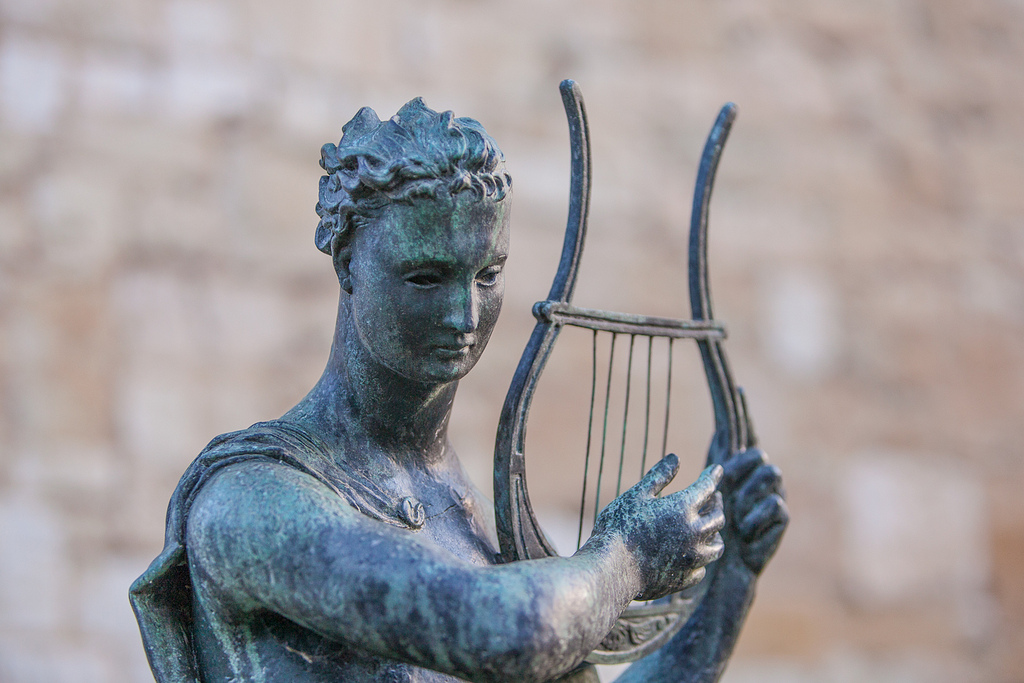
Poetry and music share a long history of mutual inspiration and collaboration. Modern song lyrics are just the most recent way that music and poetry have come together.
Once words have begun to be accommodated to music, they display qualities which might not be expected of them in their ordinary duties, and have not only lilt and balance, but tone and quality […] They are more carefully chosen than other words […] – C.M. Bowra, Primitive Song
Any aspiring songwriter can learn a lot by writing, reading, and studying poetry – because poetry was born from music long ago, and the two have influenced each other ever since.
The ancient Greeks sang lyric poetry while playing the lyre. During the medieval period in Europe, a “lyric” was any poem written so that it could be set to music – with a particular number of syllables per line. Meanwhile, western music theory adapted the concept of rhythmic meter from poetry. There would be no time signatures in music without poetry.
What makes lyric writing unique?
Many books written by commercial songwriters are quick to claim that song lyrics and poetry are different crafts. Why are they so eager to turn us away from the tradition of poetry, which can teach songwriters so much? I suspect it’s because the music industry’s job is to sell music, and compared to music sales, literary poetry just doesn’t rake in the big bucks.
The truth is that there’s only one difference between poetry and song lyrics: Lyrics are set to music. A lyric that works beautifully in a song might sound downright silly when read without music. Whether you want your lyrics to read well on the page is a personal decision.
Aside from that single difference, poets and lyricists share much in common. Both train themselves to:
- Write memorable titles, refrains and choruses
- Train themselves to hear the music hidden in language
- Take a basic idea and rephrase it in fresh, creative ways
- Weave words into patterns of rhyme
- Arrange sections of a text into a logical, seamless whole
Songwriting is a complex puzzle made up of all these problems and more.
Writing poetry is a way to exercise all of these skills which are so valuable to lyricists – the skills you can’t learn from your guitar, piano, or singing instructors.
Instead of dismissing poetry as too many commercial songwriting authors have, let’s choose to benefit from the centuries of insight that it offers us. Everything you learn about poetry can help you write better lyrics. Why not buy a book of poetry, or study a textbook on poetry a little every day?
I for one need all the help I can get.
Further reading
For practical advice on writing lyrics, see:
- Writing Better Lyrics by Pat Pattison
- Three Genres by Stephen Minot
In case you’re interested in the deep history shared by poetry and music:
- Primitive Song by C.M. Bowra
- Unsuspected Eloquence: A History of the Relations Between Poetry and Music by James Anderson Winn
Creative Commons photo of Apollo with a lyre by Tony Smith
Yes, i agree that poetry is vital, is key, is subliminally explicit in indelible lyricism. I absolutely adore writing my songs..dedicated to the glory of the LORD. I do not pen in obvious, cheeky, direct portions, rather in a measured, spiritually cerebral ether..all inspired by the Hosp. ; )))
I’ve been writing.. what I label as poetry for about 20 years. Much of with the intention becoming song. Without the melody does that make it rap? LOL. I enjoy your posts. Thank you.
Great article. I was asked about the difference between lyrics and poetry in an interview recently. Not sure I was clear in my response, but here’s what I said: http://www.pledgemusic.com/blog/chris-robley-interview
On another note, how are things in your world?
Chris!
You said: in that interview:
“I think poems can create a quiet, magical place in your mind where the resonance between thoughts really gets amplified until there’s this kind of ghostly music, […] The emptier it is, the louder the potential sound.”
Songs bounce along at, say, 130BPM. Ready or not, it’s always whipping by. It’s a more lucid and focused experience to read a poem on the page, where you can really process the meaning and hear the subtle music embedded in the language itself.
Chris, which do you find harder: sitting and really experiencing a poem by reading it, or really experiencing a song by listening?
I think it depends on the environment and the piece: but if I compare the ideal reading environment to the ideal listening environment, I think it’s harder to feel present with poetry. BUT… once I’ve gotten my reading mind in shape, I can stay in that space longer. So, it’s more difficult for me to establish that intense presence with poetry, but once I’m there, I can stay there longer than if I were listening to music (where my mind wanders after about 10-15 minutes). How about you?